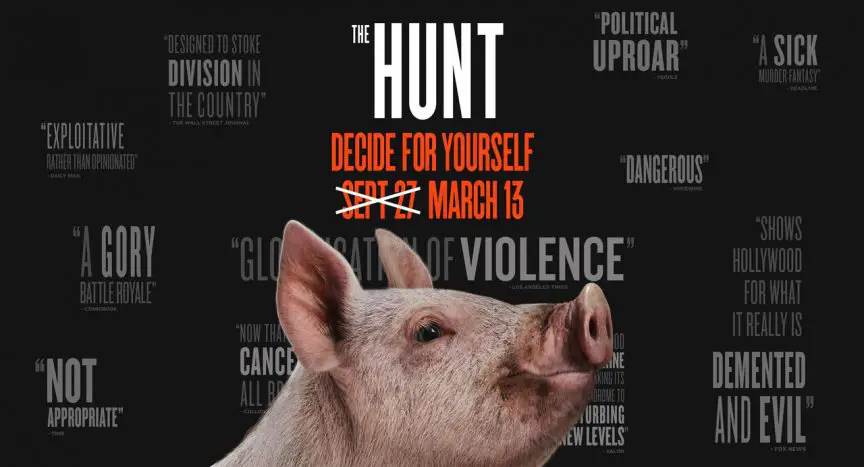The Hunt: what to say about it? The truth is that there is not much to say. And there is also a lot to say.
Through the lens of the pandemic and the upcoming elections, are we seeing it differently?
The film’s delayed release, due to the mass shootings in El Paso, Texas, and Dayton, Ohio, led to the film actually being released during an election year. And even though Blumhouse and Universal Pictures probably did make the decision to release the film later to appease audiences and to avoid a whole conundrum that would have been in poor taste, still… This movie being seen so close to the elections must have been convenient, even marketable. This is not said in a spirit of cynicism, but purely pragmatism.
Another thing that in hindsight may have worked in favour of getting people to see (or eventually see) The Hunt was the pandemic. The amount of conspiracy theories and false rumours that surrounded the pandemic, its origin, its “real” consequences, even its actual existence, was unprecedented. To the eyes of the government and many members of the public, it was a political issue more than anything else (even though it shouldn’t have been). And then The Hunt comes along. It’s got everything: conspiracy theorists, obvious references to current affairs, leaked messages, false rumours, refugee camps, et cetera.
See also: The Hunt Should Have Picked a Lane [Blu-ray Review]
Not to say that the film performed well at the box office, because it didn’t. But that is not the fault of poor marketing or unknown actors or emerging filmmakers without a devoted audience. The Hunt was the opposite on all those aspects. It simply could not override the effects of the pandemic, like any other film that was scheduled to be released or was indeed released at the time of the outbreak. However, its release turned out to be timely, considering the film’s content. It will inevitably be forever connected to the events of 2020 (whether that is good or bad is debatable).
Ambiguity: Smart or Tone Deaf?
No one is mentioned by name in The Hunt. Not the parties, not the president, not any news outlet, no movement, no one. While this is obviously on purpose, audiences were divided as to whether it worked in favour of or against the film and its objective (whatever that was). In spite of all this supposedly smooth, but more like completely see-through, ambiguity, it was obvious who was who and who represented what. The thing is, it’s difficult to criticise everything and simultaneously make a point about nothing.
Not taking a stance, but being the “aloof, cool person” who just judges everyone and everything isn’t slick anymore. Nowadays, it is just tedious. Are the filmmakers smarter than everyone else? Are they deeper thinkers than everyone else? Do they believe they are? Well, they exploited the film’s controversial reputation for marketing quite well. Even remarkably, if one may say so. But knowing that people will want to see your movie and knowing what your movie actually is are two different things.
Even the film’s end makes a point of not taking a stance. The person who wins (Crystal) was there by accident. She wasn’t really one of the “deplorables” the “elites” had their eye on. Her being there was an issue of mistaken identity. A slip-up that wouldn’t have happened if the “elites” had taken better care to double-check whom they kidnapped. She was Crystal May, while they actually wanted Crystal Mae. A woman from the same town, same neighbourhood, with an almost identical name. What’s that supposed to mean? The person without a side is the real winner? Who knows?
See also: The Most Shocking Thing about The Hunt is How Boring It Is [Review]
Whose side was it on?
The movie drew the attention of Donald Trump and was heavily criticised from his followers and those from the conservative political side who denounced the film’s depiction of “deplorables” being hunted down by “elites”. Which seems weird, because usually conservatives love to say “See, we are the real victims here,” or “We condemn violence on all sides, on many, many sides.”
Let’s be honest here though. The collective of ideas of impartiality, rationality, objectivity, and logic TM, as they have come to be used and talked about on the Internet today, are usually put forth by one side of the political spectrum. If you’re smart enough to see through the movie’s implications, then you’re smart enough to know to whom I’m referring. So, by “not picking sides” the movie is picking sides, whether they (and the audience) understand/like that or not.
See also: Gerald’s Game Plays Well with Social Commentary and Suspense
What was good about it (and was it enough)?
Many were put off or even downright disgusted by the violence and gore in this film. But the action was very well choreographed and the gore quite amusing. Even though the movie’s criticisms and messages were all over the place, at moments the action still made one feel that the stakes were high. It is, in many ways, a horror film after all. If one cannot handle gore in a feature that was advertised as containing gore, then maybe they should have known better and not watched it. Nevertheless, in a flick that was hyped as social horror / political thriller (or even -hear ye, hear ye- as a social thriller in the calibre of Jordan Peele), satisfying action and gore couldn’t be the sole saving graces. They were small life jackets for a big sinking ship.
In the end, maybe the talk about the thing was bigger than the thing itself. Maybe, the controversy was so overwhelming that it made the film underwhelming. Perhaps, The Hunt did not deserve the extremely negative reviews it received… because it didn’t deserve so much attention after all.

